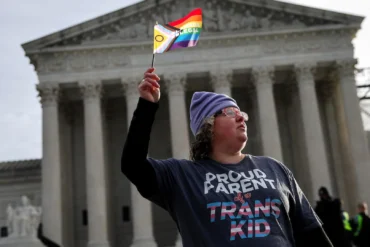In a landmark 6-3 decision on June 18, 2025, the U.S. Supreme Court upheld a Tennessee law banning gender-affirming medical care for transgender minors, a ruling that could reshape healthcare access for young transgender people across the nation. The case, United States v. Skrmetti, marks the first time the Court has addressed transgender healthcare, and its impact is expected to ripple through the 25 states with similar bans.
The Tennessee Law and Its Challenges
Tennessee’s law, known as SB1, was passed in 2023 and prohibits medical treatments like puberty blockers and hormone therapies for minors seeking to address gender dysphoria, a condition where a person experiences significant distress due to a mismatch between their gender identity and their assigned sex at birth. The law allows these treatments for other medical conditions, such as early-onset puberty or congenital defects, but specifically targets their use for gender-affirming care.
Three transgender Tennessee teenagers, their parents, and a doctor who provides such care challenged the law, arguing it violated the U.S. Constitution’s 14th Amendment, which guarantees equal protection under the law. They claimed the ban discriminated based on sex and transgender status and infringed on parents’ rights to seek necessary medical care for their children. The Biden administration initially supported the families, but after President Donald Trump’s return to office in January 2025, his administration reversed that stance, backing Tennessee instead.
The Supreme Court’s Ruling
Chief Justice John Roberts, writing for the conservative majority, argued that Tennessee’s law does not discriminate against transgender individuals. He emphasized that the ban responds to “an ongoing debate among medical experts” about the risks and benefits of puberty blockers and hormones for treating gender dysphoria. “SB1’s ban on such treatments responds directly to that uncertainty,” Roberts wrote, framing the law as a cautious approach to a complex medical issue rather than discriminatory.
The Court’s three liberal justices—Sonia Sotomayor, Elena Kagan, and Ketanji Brown Jackson—strongly dissented. Justice Sotomayor, who read her dissent aloud from the bench to underscore her disagreement, called the ruling a “devastating” blow to transgender youth. She argued that the law clearly discriminates based on sex, as it restricts treatments for transgender minors while allowing them for others with different medical needs. “The Court abandons transgender children and their families to political whims,” Sotomayor wrote, warning of “untold harm” to vulnerable youth.
Divisions Among the Justices
The ruling revealed tensions even among the Court’s conservative justices. Justices Clarence Thomas, Samuel Alito, and Amy Coney Barrett wrote concurring opinions, asserting that discrimination based on transgender status should not trigger heightened constitutional scrutiny, a legal standard applied to laws targeting groups with a history of discrimination, like those based on race or sex. They also sought to limit the impact of the Court’s 2020 Bostock v. Clayton County decision, which extended federal protections against sex discrimination to transgender individuals in employment, arguing it should not apply to constitutional challenges like this one.
Justice Alito went further, suggesting the Tennessee law might indeed discriminate based on transgender status but was still constitutional because such discrimination does not require heightened scrutiny. Meanwhile, Justice Kagan, while joining most of Sotomayor’s dissent, declined to fully endorse the argument that the law fails heightened scrutiny, noting that lower courts had not yet addressed this question.
Reactions and Broader Implications
Tennessee Attorney General Jonathan Skrmetti hailed the ruling as a “landmark victory” for “evidence-based medicine” and state autonomy, arguing that the ban protects minors from “irreversible” treatments. Republican state lawmaker William Lamberth, a sponsor of SB1, echoed this, claiming the law shields children from “harmful” and “unproven” interventions.
Transgender advocates, however, condemned the decision. Kelley Robinson, president of the Human Rights Campaign, called it a “cruel betrayal” of transgender youth, while ACLU attorney Chase Strangio described it as a “devastating loss” for constitutional rights. Medical associations, including those noting higher suicide risks among youth with gender dysphoria, argue that gender-affirming care can be life-saving and that treatments like puberty blockers are reversible, contrary to claims of “irreversible harm.”
The ruling could embolden other states with similar bans and align with broader policy shifts under President Trump, who has taken a hardline stance against transgender rights, including issuing executive orders to limit gender-affirming care and exclude transgender individuals from certain sports.
What’s Next?
While the decision is a setback for transgender youth, advocates like Strangio emphasize that it does not overturn existing protections against other forms of discrimination. The fight continues, with groups like the ACLU and Lambda Legal vowing to defend transgender rights. Meanwhile, public opinion remains divided: a June 2025 Reuters/Ipsos poll found 53% of Americans support bans on gender-affirming care for minors, with stronger support among Republicans (57%) than Democrats (23%).
As states and courts grapple with these issues, the debate over transgender healthcare remains a flashpoint in America’s culture wars, with profound implications for young people and their families.








